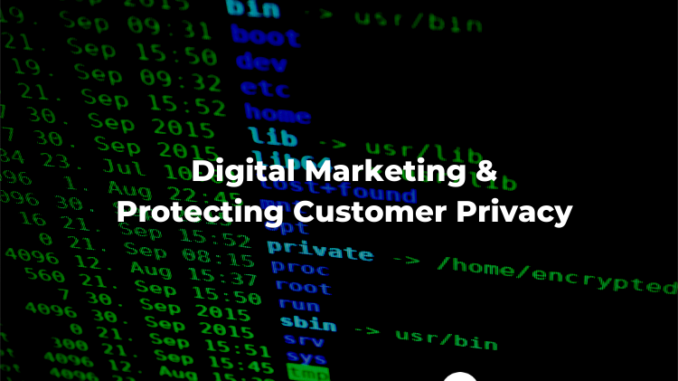
The balance between the data needed to market effectively and the consumer’s right to privacy is a delicate one. If you can imagine digital marketing as an ecosystem, the three main life forms within this ecosystem would be brands, marketers, and consumers. As such, survival depends on a favorable environment for all three, something called homeostasis, in scientific terms. Homeostasis ensures that everyone can thrive and multiply.
Most brands collect data about their users through their website or mobile app. The data is either submitted by the user or automatically collected through the use of cookies and other technologies. As more and more brands want a piece of the digital advertising pie, this data has become more critical than ever in order to create marketing content that is narrowly targeted.
A few decades ago, no one would know that while you were in a department store you spent fifteen minutes in the small appliance section, then changed your mind about the socks in your cart and put them back. The store manager wouldn’t know where you came from or how long you spent in the store.
Now, brands can see where you came from, what pages you clicked on, how much time you spent there, and what you ultimately bought or put back.
Data privacy is a relatively new topic in digital marketing, but one that is growing in importance. Data breaches and misuse of information has brought consumer protection and proper stewardship to the forefront: those who disregard consumer opinion or mismanage information are now open to both reputation damage and financial consequences.
Defining Consumer Privacy & Security
Many people in the industry and in the general public confuse the two related concepts of privacy and security. Consumer privacy is about people’s right to control how their information is shared with others in digital channels. Security is more of a technological function and focuses on the safety of the information collected. Security is integral to managing and safeguarding the information given from outside parties who might illegally access it.
The Rise of Data-Driven Marketing
Data-driven marketing is important for all effective customer experience initiatives. One of the most effective means of acquiring customers is through personalized marketing. Personalization uses customer information to disseminate offers for services or products that are specific to that user’s individual needs. Global multi-channel business communications and marketing solutions firm RRD defines personalization as “one-to-one marketing in the truest sense – one brand speaking directly to one customer.”
Personalized marketing has shown exceptional success because it works for everyone in the ecosystem. Consumers like being presented with offers relevant to their lives. They don’t want to be thought of as a number. In addition, offers that are targeted to them add convenience. In exchange, marketers and brands prosper.
Here are a few important statistics illustrating the success of personalization:
The Consumer Point of View
The statistics and information above point toward consumer acceptance of, and even desire for, collecting personal data that can provide a more enjoyable and convenient experience. At the same time, consumers do worry about the security of the information collected.
A 2018 poll by cybersecurity services firm, Semantec reported that 83% of internet users worldwide were concerned about their privacy and want accountability. And there is a growing percentage of consumers who have taken steps to at least limit data collection by deleting cookies, opting out, and creating emails used only for shopping so they can separate personal and professional personas. However, it seems that although consumers express some concern, 61% are still willing to accept certain risks for added convenience.
Clearly personalization serves a desired purpose all three inhabitants of the ecosystem. Personalization enriches customer experience, provides advertisers with an effective way to break through the marketing clutter, and provides brands with greater revenues. Yet collecting and using data makes customers vulnerable and puts the brand at risk of losing customer trust, or worse- being held liable financially.
Increasing Consumer Trust
It would be wise for brands and marketers to not solely consider customer experience in terms of their marketing tactics or ease of web use. Safety and reliability are also vital for building the customer trust needed for long-term success. Advocating for privacy is a strategic opportunity for brands and marketers. Make data privacy one of your brand’s core values.
Advocating for privacy is a plus for brands and marketers that can spin privacy into long-term trust and brand value instead of aiming for short-term leads. Your customers are definitely thinking about privacy when they are visiting your website or using the mobile app. Make privacy one of your brand’s values by demonstrating that their privacy is important to you too.
Ten Tips For Better Data Stewardship

Embracing Data Privacy
Data privacy and protection is a hot topic in 2020. Protecting consumer data should be as important as protecting a company’s patents and trade secrets, and involves much more than defending your web assets from hackers.
Respecting, safeguarding, and promoting data privacy needs to become ingrained into digital marketing strategies, practices, and process because it is definitely here to stay. Privacy regulations will continue to grow and evolve as the technology for collecting and using data continues to grow.
Recent Accenture research revealed that 80% of consumers between the ages of 20 and 40 in the United States and the United Kingdom believe privacy is a thing of the past. If this is the case, there is much to be gained by marketers and brands that can use and promote their value of good data stewardship.
The bottom line is that great content is the engine that compels users to provide data. If brands can earn data with relevant and impactful content and then keep customers because they trust the brand to secure that data, great long-term relationships between the two can flourish. It’s a win-win.
Deborah K.
Deborah was the kid who would rather write book reports and essays than play ball during recess. Although she didn’t score many points with her peers, it did lead to her career creating content for TV, radio, print and new media for companies as varied as Dooney& Bourke, Panera Breads, Visa, SUNY Ulster and Hudson Valley Federal Savings Bank.
She is also a principal of small packages – a digital design company, and past partner/marketing director of whatis.com, the world’s foremost reference on information technology. And, her love of food enabled her to become a contributing editor of both Gourmet Retailer and Food Distribution Magazines.
Deborah has a bachelor degree in fine art from the Hartford Art School, University of Hartford and a masters in higher education administration from Stony Brook University. When she’s not writing, her love of quilting, furry animals, friends, and family sustains her.
